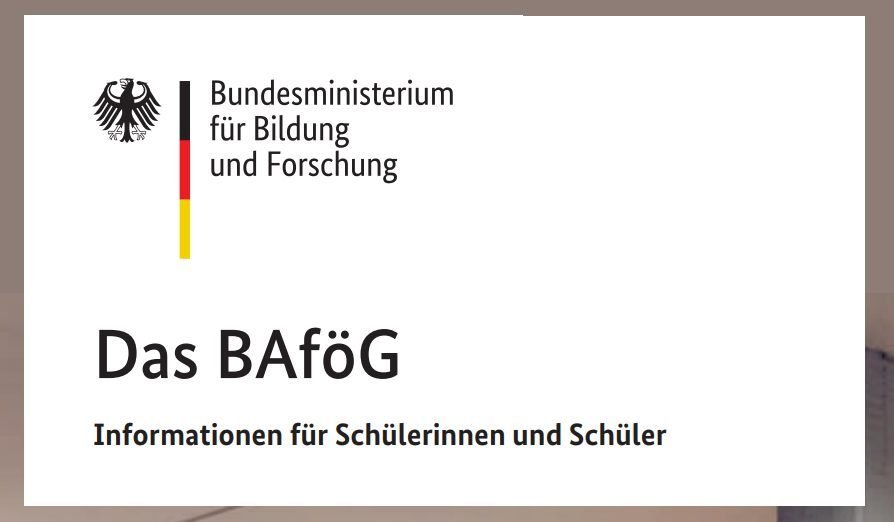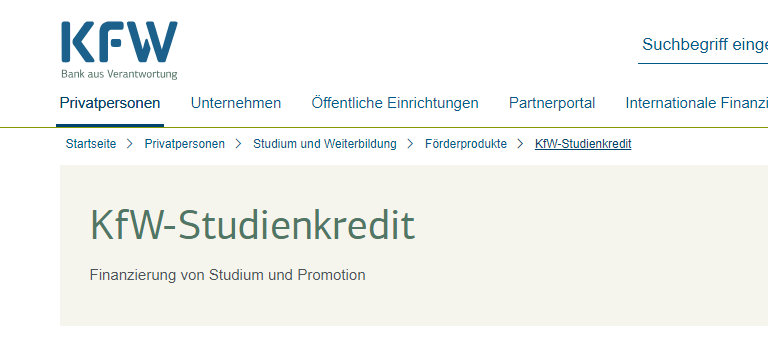Applying for a Student Loan in Germany might be required for Some students. Even though studying at German Universities is Free of Charge for International Students in all but 1 German Federal States. As Living Costs can become a huge problem specially for Non-EU international Students. Thats is why in this article I am Going to Share Details on How to Get a Student Loan in Germany.
Do this to get a Student Loan in Germany
Student Loan VS Student Credit in Germany
Before I share the various types of student loans for international students coming from non-EU countries, let’s clear up a common source of confusion.
The difference between a Student loan and a Student credit. You’ll find these terms used interchangeably on the internet, but they mean slightly different things.
A student loan is money set aside specifically for students to cover ongoing expenses like study costs, food, clothing, and more. Importantly, this money is usually paid out in installments over an extended period.
On the flip side, a student credit is a lump sum loan you receive from a bank or other credit provider. It’s not intended to fund your entire education but rather for significant one-time expenses, like relocating to a new city, and similar situations. In this video, I will be focusing exclusively on student loans
Student Loan Options for International Students
Germany has different options for student loans, but if you’re from a non-EU country, your choices become more limited. Your eligibility depends on your legal residency status, which is linked to your nationality.
Potential Student Loan Options in Germany include
- Federal Training Assistance Act or BAFöG
- KfW Student Loan
- Education Loan from the Federal Office of Administration or BildungsKredit
- Loans from Student Unions like Studentenwerke
- and Student Loans from Individaual Banks
Federal Training Assistance Act (BAFöG Student Loan)
BAFöG stands for Bundesausbildungsförderungsgesetz , this is a special Training Assistance Act from the Federal Government which is designed to help all prospective students to Study regardless of their Financial or Social Situation. This funding is Available for both German and Foreign students.
As the name suggests, this student loan is designed to provide support for those undergoing training.
Money is provided in a mix of a simple grants and zero-interest education loan in Germany, and a monthly maximum of €934 € if given out. This is the maximum amount and can be lowered based on the students situation.

Requirements for BAFÖG funding
According to the Law, you are only eligible for support if you meet one of the following criteria
Foreigners with permanent residency rights:
- You’re married to an EU citizen or related to them.
- Your parent is an EU citizen.
- You have a permanent residence permit.
- If you’re a refugee or asylum seeker and have good prospects of staying, you can receive BAföG after 15 months.
Foreigners with a residence permit:
- If your residence permit is based on the prospect of staying
- If it’s not, you need to have been in Germany for at least 15 months before training begins.
- Your residence permit might fall under specific categories listed in the law. Ill put those details below the like button
Other foreigners:
- Or, if one of your parents has been in Germany for three years in the last six years
- If you live in Germany and have a partner with German or EU nationality
- If a parent has lived and worked in Germany for a few years, you might qualify.
- If you’ve been in Germany for five years before starting your studies and covered your own expenses
These rules are pretty strict and sometimes tricky. But the bottom line is, if you’re coming to Germany just to study without any of these connections, BAföG might not be an option. If you do fit one of these rules, you can Apply for Bafog with an online application via their website.
Related Guide: 9 Tips for Students in Germany to Save money
The Kfw Student Loan in Germany
Kreditanstalt für Wiederaufbau (KfW) is a well-known student loan provider in Germany. In fact, the term “KfW-Studienkredit” is often used generically for this kind of loan. However, eligibility for the KfW Student Loan in Germany is determined by the credit institutions that provide it.
You can get tje KFW loan as a student if you are doing your first degree, an additiaonla course for studying, masters degree or even a phd. You can also Apply for this loan in Addition to BAFöG. And unlike BAFöG you can also apply for this student loan if you are doing part time studies.
The KFW Student Loan can provide up to 650€ per month.

Who can apply for Kfw Student Loan?
This opportunity is open to non-EU international students only when they fall into one of these categories:
- They are family members of German or EU citizens residing in Germany.
- They are considered “Bildungsinländer:innen,” which means they are foreign students who obtained their university entrance qualification in Germany or at a German school abroad.
If you are eligible to apply for the Kfw Student Loan, you can submit an online application and recieve your first payment your desired date.
Bildungskredit or Educational Loan from the Federal Office
The Federal Office of Administration offers this student loan in Germany to support school education and university studies.
The educational loan program offers a temporary, low-interest loan to assist students in advanced stages of their education. It’s an extra option to finance your education, regardless of your or your parents’ income and assets. The education loan aims to support those not eligible for BAföG and to cover additional expenses for BAföG recipients, like special study materials, trips, or school fees. The terms of the loan are designed to be favorable to students.
How Much Loan Can Students in Germany get using Bildungskredit?
Bildungskredit or Educational loan is distributed in monthly payments in consistent amounts. You can apply for monthly installments of €100, €200, or €300. During one educational period, a maximum of 24 monthly installments, totaling €7200 can be granted.
As long as the overall limit of 24 installments and €7200 is not exceeded. A portion of the loan can be provided upfront as a lump sum payment, up to €3600. This is possible if you can convincingly demonstrate that it’s required for a specific extraordinary expense.
Can Non-EU Students Apply for Bildungskredit?
This student loan is not just for German students. Students from non-European countries can also access it, though with some restrictions. The eligibility criteria for students from non-EU countries are quite similar to those for BAföG.
- At the time of application, you are either the spouse or partner of a German citizen, an EU citizen with permanent residency, or
- you are the child of a German citizen or an EU citizen with permanent residency, or
- you have lived in Germany for at least five years before starting your studies and have covered your own living expenses (holding a settlement permit).
Just like BAföG, this loan option doesn’t offer much flexibility for students from non-EU countries. However, if you meet any of these criteria and wish to apply for this student loan to fund your studies, you can directly apply for the educational loan through the Federal Office of Administration’s portal.
Related Guide: Best Free Credit Cards for Students in Germany
Student Loan in Germany from Student Unions
If you’ve been wondering if you can get a student loan in Germany without a German high school diploma or family ties to German or EU citizens, the answer is yes! There are student loans available for non-EU students that bypass these restrictions. One way to access these loans is through student service organizations affiliated with your university.
For instance, from Student unions like Studentenwerk . With these loans, your nationality won’t be a deciding factor in your application.
Here’s what you need to consider:
- You should be studying at a college or university that’s part of the network of student unions offering these loans. You can usually find this information on your university website or check the directory here.
- You must genuinely need financial assistance.
- You’ll need a person with permanent residency in Germany to vouch for you during the application process. This individual should be able to show proof of employment in Germany through income documentation.
Even though it may seem easier to qualify for this type of student loan, its highly recommended reaching out to your university’s student union to learn about the specific requirements they have in place. These requirements can vary between different states.
If you decide to apply for a student loan, you can visit the Studentenwerk’s website to find out how to proceed.
Student Loan in Germany From Individual Banks
If you’re thinking about getting a student loan, it’s a good idea to explore what various banks in your city have to offer. You don’t always need to have an existing account with a particular bank, but sometimes it can be a wise choice. Many German banks also help arrange the KfW student loan.
However, some banks go the extra mile by providing their own student loans. The key factor here is whether you’re enrolled at a state-recognized college or have been accepted into a university. The cool part is that these student loans don’t rely on your income, and you won’t have to provide collateral, like guarantees, during the application process. For the details on applying and next steps, it’s best to check out the websites of these banks directly.
But here’s the fine print: The conditions for these student loans are often not as lenient as those for BAföG or the KFw loans. So, it’s crucial to carefully assess your actual financial needs in advance and explore whether you might have other financial options that could cover those needs.
In my opinion you should only think of Getting a Student Loan in Germany as the last resort and start optimizing your finances. I have a detailed guide on Personal Finance for Students in Germany which can be a great starting point.
Disclaimer: None of the content in this article is meant to be considered as legal, tax or investment advice, as I am not a financial expert or a lawyer and am only sharing my experience with stock investing. The information is based on my own research and is only accurate at the time of posting this article but may not be accurate at the time you are reading it.
